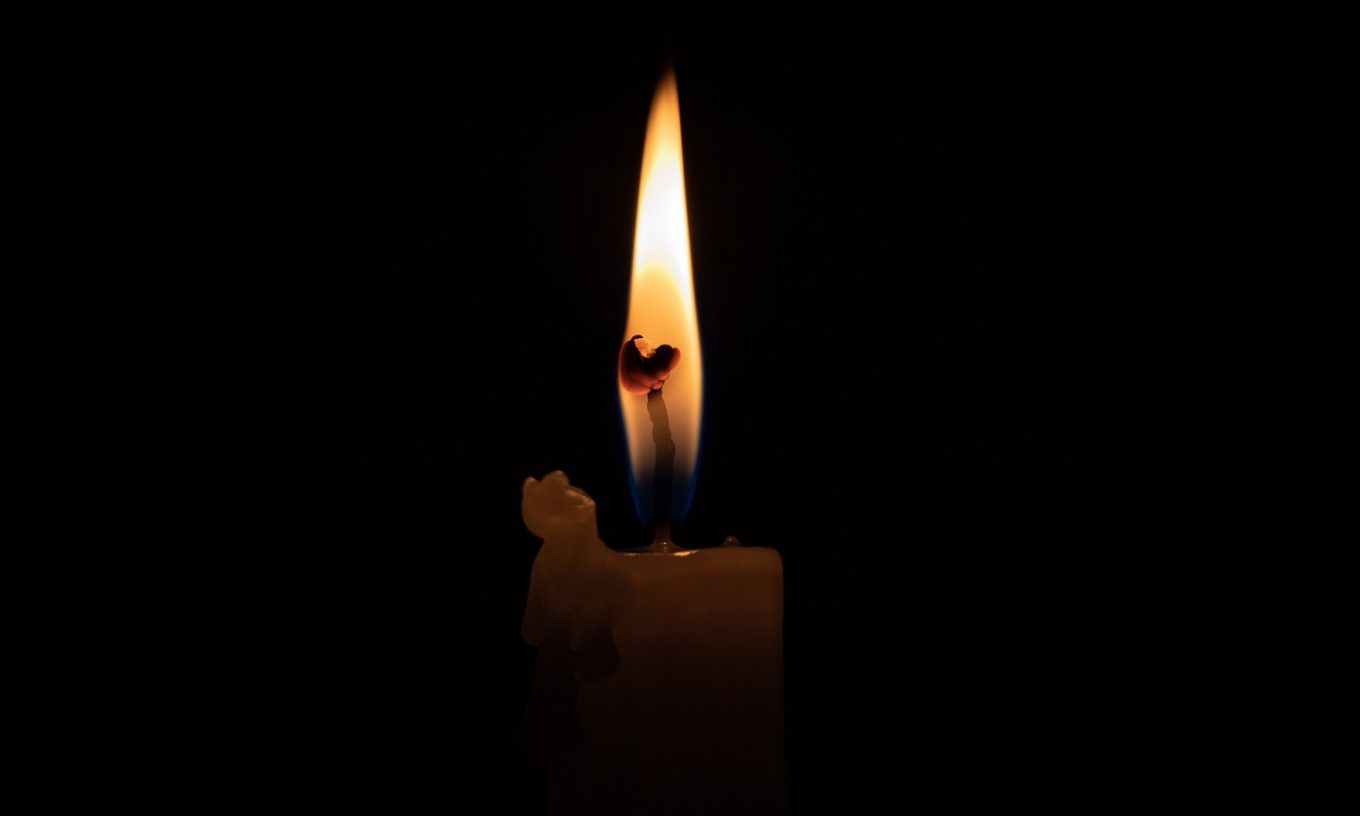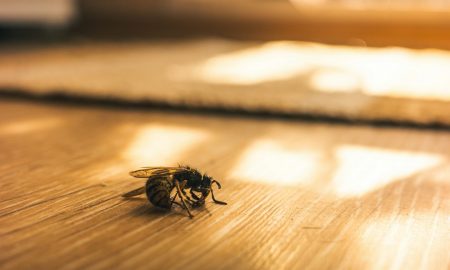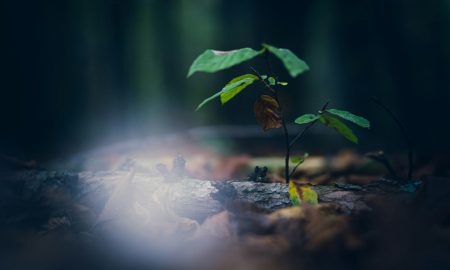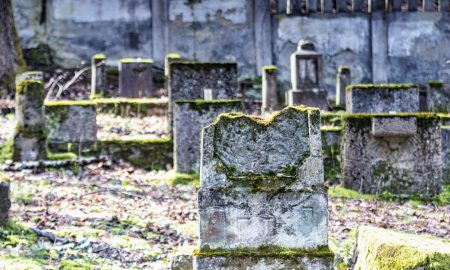[Introductory Rites]
When the light of morning comes—not crisp sunshine, which would offer some relief, but light muted behind low clouds—I step into my Muck boots. Next, I put on the insulated overalls I bought two winters ago because they reminded me of the farm and prairie blizzards, and in them, I am invincible against the wind. The dog nudges me, desperate for a walk. I pull his tweed sweater over his limbs and touch his head. I step outside and then decide that it is best to leave the dog behind for this funeral of my own making.
[Gathering Hymn]
Hours earlier, at 5:00 A.M., my mom called. Hearing nothing but her breathing when I picked up, I figured that this was one of those dreaded once-every-few-years calls with reports of bad news. “Mom? Are you there?” I had asked in that hallowed space of quiet before she released her cry and managed to say, “She’s gone.”
After hanging up, I had returned to sleep. In my slumber, tears seeped from me as if I was one of those purported weeping Virgin Mary statues—still, unmoving. Now awake, I can’t help but think of my grandmother’s body: shrunken and emptied, turned into muscle and tendon, exhausted of life. No one could be there at her end. No one can report the facts.
In the strange haze that death brings, my mind serves me a memory that isn’t really a memory but an image paired with a feeling from my first funeral. The image: a broken sidewalk on a small-town side street, a darkened sky holding rain, white clapboard siding, thick-glass windows. The feeling: a probe on my belly, pushing deep into my psoas muscle, a simultaneously nauseating and rapturous wave. My great-grandfather Albert had died. He had been a shoemaker who had come to the United States from Bohemia. Albert had sat in grandmother’s kitchen chair every day, stirring cream into his afternoon coffee with a tink, tink, tink of the spoon. The sky on that day was like it is now, depressed. At his funeral, I saw adults cry for the first time.
Later I will chase the mystery of death through horror movies like Nightmare on Elm Street and Friday the 13th, and later yet through poetry and philosophy and religion. Later yet, I will avoid it.
[Invitation to Prayer]
When COVID hit the nursing homes, I knew that if my grandmother couldn’t hear familiar voices or feel the constant reassurance of touch; that if no treat of ice cream, the only food she welcomed with pleasure, would be lifted to her lips—the end would come. And now it is here.
As I walk into the world, I prepare to say goodbye in a way I do not yet understand. I take a step and another down this gravel road, then bend over and sob. I look to the landscape to lead me and glance at the frozen lake behind our cabin. The spring thaw has created an opening far down in the center of the lake where whitecaps lap upon the iced surface. After being isolated for weeks with my wife, I crave that movement. Yes, movement is what I need for this funeral of one. Walk. Go. I step from the gravel road and head north into the soft field peppered with harvested corn stubble. With my body, I trace the lip where field meets shore, floating like a ghost toward that open prairie sea.
[Liturgy of the Word]
I am suddenly grateful that I am here and not in the city. I have always been drawn to this Minnesota water land, but Grandma wasn’t fond of lakes, having almost drowned as a child. When my office abruptly shut down, and we all had to operate remotely, I came here to work and to finish writing a book about water. Just last week as I was writing, I recalled how on one of my previous visits with Grandma, she had sarcastically declared her name to be “Janet Water.” This was her way of protesting as I held a straw to her lips, coaxing her to drink. She thinks the water is poisonous, my mom had told me.
“So. You’re Janet Water, huh?” I had offered Grandma in playful scorn.
“Might as well be, with all of that water,” she had responded, staring at the dreaded straw.
Grandma’s mind had become stuck somewhere none of us could understand, in a place that rendered her paranoid and angry, which had never been her nature. She believed that everyone in the nursing home was trying to kill her. By the looks of her, this didn’t seem to be a giant leap. She had grown gaunt, weighing just under ninety pounds. The right side of her face had been stained the color of eggplant from her most recent fall.
“She has a right to fall,” Mom said, rolling her eyes when I asked how Grandma could be so injured with all the people to watch her.
“They can’t, I don’t know, strap her in?” I had probed, knowing that Grandma’s mind and body were no longer cooperating.
“No, she has a right to fall,” Mom repeated, parroting what she had been told. She had been at her mother’s side nine hours a day, but she couldn’t fill the cracks of time when injury came; or, as it turns out, death.
[First Reading – Old Testament]
I am now my grandparents’ age when I was born, which is old enough to have witnessed many lives transition from birth to adulthood and from midlife to old age. Old enough to now quantify time, like bricks, to gauge my remaining years.
From this vantage point, I see the error of youth, when one tends to process death as more or less tragic depending upon the deceased’s age. Lives are measured. And now there are decision-making algorithms to determine who gets treatment when the hospitals fill with those fighting the virus.
But lives can’t be measured. Her advanced age doesn’t mitigate this ache. Even as Grandma’s body seemed to vanish, and dementia staked claim of her mind, she was as whole to me as she was when she was 45, rocking me and singing, “There’s an old spinning wheel in the garden / Spinning dreams from so long, long ago / Spinning dreams of an old fashion garden / And a maid with her old fashion beau.” That song she sang spun within me a story of longing and forbidden love, which my tiny being already knew to be my fate.
Years before I would break my silence or before same-sex marriage became legal, Grandma, devoutly Catholic, in so many ways an archetype of her time’s values, had whispered in my ear, “Doesn’t matter to me. I love you no matter what.” With that, she gave me a fortified shield to wield against fire and brimstone as I clawed my way toward light.
[Second Reading – New Testament]
Life does not only flash before the eyes of those nearing death but also before the eyes of those left behind. In this field that is now a funeral, I see a hologram of my childhood pressed over the black earth. There I am, ten, wandering the fields near our farm, weaving in and out of cottonwood shelterbelts, picking up and reading fragments of burned newsprint and discarded cereal boxes as if they are clues. There’s Grandma walking out of the farmhouse. Visiting from Wyoming, she’s carrying my baby brother on her hip, her dark hair fluttering in the wind as if to illustrate her grace.
Her wedding picture had so perfectly captured her beauty. At age 19, she wore a wool skirt suit and a pop of lipstick that seemed to bleed ruby even through the black and white photo. The suit framed her tiny waist and full breasts; her chest was an often-admired feature she would conceal her entire life. Into the camera, she gave that mischievous stare, which she gives me now in this mirage as she bounces my brother.
“Grandma!” I call.
“Grandma’s not here. Can I help you?” She responds, always her joke.
But now, she’s really not here.
Another memory spreads across the field. My parents load me and my siblings into the brown GM van; we sleep on the 14-hour drive to our grandparents’ mountain town filled with lights and purple shadows and cowboys and scents of anise and Chex mix. The year I was born, my grandparents moved west for Grandpa’s job with the railroad. Now, in my mind’s eye, we pull up to their yellow house tucked under a towering white pine. Everything is warm as I run through the door. Down the stairs, they come in their robes, Grandma’s hair set in curlers. They dance when they see me.
[The Gospel]
Starting back when I was in college, I began to memorize my grandparents’ physical form. I knew it was fleeting. I recorded my grandfather’s methanol chap stick, touched his bald head, and noted how his skin’s oil had just a bit of stickiness, like a holy ointment. I cataloged the dips in grandma’s shoulders, held her hand, and traced her knobby fingers, which held bingo cards and the remote control to access her beloved The Price is Right.
When I did this, my chest stung with the dread of a final goodbye that would not come for another two decades. Grandpa died first from mesothelioma caused by asbestos exposure. He seemed to drown in the end, as no human should, especially not him; he took such care of his body and showed only kindness. I still wonder what specific calculous went into the railroad’s decision to determine how many lives they could sacrifice to make their eventual liability worth the profit. They knew. The companies always know.
[Liturgy of the Eucharist]
Midway down the lakeshore, I listen for the sloshing of water. Through the trees, I see movement: whitecaps rolling shards of ice onto the frozen surface of the lake. Here winter meets spring. Fluid meets solid. Birth meets death.
I veer from the field and dip into the wooded shoreline. The thorn and brush are thick, but I tear through them to get to a boulder that, long ago, glaciers had randomly flung into this cover of oak. I sit on the rock and watch the lake. It is as if the water is boiling, with this churning of ice, with this crashing of seasons.
The rock is cold. Tears come again. I take off my gloves and trace the boulder’s grainy surface as I would a headstone, seeking any last ounce of Grandma’s life force.
[Presentation of the Gifts]
Is there meaning that she passed on this day of ascension in the Christian tradition, so sacred in her belief system? Even though I left the church long ago and hold the institution’s teachings responsible for much of the pain in my early childhood, something about Easter still stirs me. The image of Jesus rising from the dead calls me to a yearly reset and renewal. And, without trying, I always wake when the first bird sings and the earth is still periwinkle.
Grandma had shared my detective-like hope that the universe would throw some sort of supernatural phenomenon my way. “C’mon. Maybe a spirit sighting? Just one UFO?” She did have an incredible track record with Saint Anthony, the patron saint of lost things, often brokering a deal when any of us were wild with panic due to a misplaced item.
Weeks earlier, I had told my wife that Grandma would die on Easter. Somehow, I just knew. And so, I wonder now: Did she somehow cast a contrail of magic, leaving in the wake of Easter morning?
[Communion]
I look up to the sky, float up, satellite view of the earth. From here, I see others mourning too. First, I notice my family, scattered about, unable to gather. And now I see thousands of others; their hands pressed to their loved ones’ nursing home windows. All of our voices rise into the void, “Don’t let them die alone.”
In this field in the middle of nowhere, on the shore of a frozen lake, there is small comfort in the collective heave of sorrow and the knowingness of strangers.
[The Lord’s Prayer]
Forgive us our trespasses. To continue with my grief, I must also acknowledge my privilege. People die alone every day. People die from a lack of food and medicine. People die in prison. And, right now, the globe seems in another tectonic shift of the continents. Those with resources are feasting and reaping bounty as they float on one chunk of land. And those born into cycles of poverty are making the most of their poisoned resources as they float on another.
Still, even as I acknowledge my full coffer, the desire to administer comfort in a final moment, to whisper goodbye, to hold a hand, presses on. So common is it to say that we are born and die alone. Perhaps we mean to say that we are alone in that unknown conscience right before we enter and after we leave. Grandma had been at my mom’s side when I, the first grandchild, entered the world. What I would have given to have been there to help usher her out.
[Song of Farewell & The Incensing]
No one can see me out here, mistake me for an insane woman in a field by a lake, and so I say out loud: “She’s gone. She’s gone.” Heaving my voice into the air helps my mind assimilate the facts. Suddenly, I understand why there is something to viewing the body; why those lost to war must be returned home. The living animal craves conclusion.
I push myself off of the rock and stand for a moment under the tree cover. Though the cold air holds tight molecules of pollen and weed and sap, I can still smell the earth. Bending down, I cup a handful of leaves and sticks, crack them between my hands, lift them to my face, and inhale.
I return to the worn indent that runs adjacent to this jumbled shoreline of felled trees, vines, and brush. I have never before ventured this far down the field because fear usually takes hold. But fear of what? I once searched for the most dangerous animals in Minnesota, and the list yielded cows and bees. A laugh escapes me because it is my maternal linage that seeded my tentative nature. Grandma was a chronic worrier, wringing her hands as she tracked everyone’s woes; Mom still warns me to be wary of strangers and to wear a seatbelt.
“We’ve got this, Grandma,” I say into the wind and keep walking.
[Prayer of Commendation]
On my last visit to the nursing home, upon arrival, I had whispered to my mom that I had to pee so badly that I hadn’t realized my squat was off-center over the toilet and I had, it is true, just urinated all over the bathroom floor. Suddenly Grandma erupted with laughter. She looked at me and shook her head in disapproval, her eyes watering with the glee of a giggle. It was as if a fairy had fluttered in and held a wand to her head, commanding, “Come Back!” I grabbed her hands, all of us laughing as we milked the sweet moment of her awareness.
That afternoon we wrapped Grandma in blankets and wheeled her outside. I pushed her wheelchair from the sidewalk to the earth so that she could feel the spongy give of the soil. She looked not elderly, but entirely new to the world as she closed her eyes and welcomed the breeze.
Later in the dining hall, we filled her ice cream cup as many times as she wanted. Her food was otherwise blended and disgusting, and so watching her enjoy a treat provided us with comfort. While most days she was inconsolable and unreachable, on this day, she was at peace.
I sat with her for hours, first by the window to watch wild turkeys and then in her room to watch oldies on TV. As I stroked her head, I considered that she was not lost to dementia but rather an oracle, her jumbled language filled with reports from a world beyond. I applied meaning to her words as I did as a child to those burned scraps in the woods.
Later that day, I drove away from the mountains, back toward the prairie, spilling tears.
[Recessional Hymn]
I gave the eulogy at both of my grandpas’ funerals but will not do so for Grandma, not in this time of isolation where nothing is familiar. And so, when I get to the end of this field that edges a thawing lake, I do the only thing I know to do. I turn back. Keep walking. And now, with each step, on this day of my grandma’s death, on this Easter of this pandemic year, I consider what I might have said. I look to the trees. I think I would have said that it is all unfair. Unfair that Grandpa’s life was cut short by mesothelioma and that Grandma, a worried soul at the end, had to die alone without comfort, as did thousands of other people. That life is unfair, yes, but still, I am lucky because my life included two people who danced when they saw me.
Photo by Majid Gheidarlou on Unsplash





